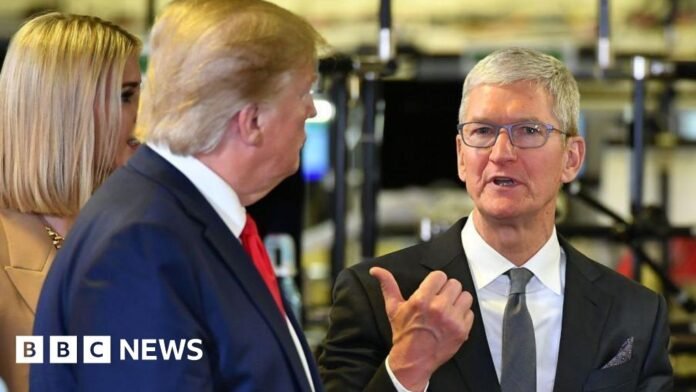Apple is planning to boost investments in its home country by another $100bn (£750m) as it comes under pressure from the Trump administration to do more manufacturing in the US.
The White House said the money would be used to encourage firms to make more Apple parts in the US and would add to the company’s previous pledge to spend $500bn in the US over four years.
Apple did not immediately comment.
On an investor call last week, chief executive Tim Cook referenced the company’s earlier commitment and said it was looking to “do more” as it tries to avoid a wave of tariffs poised to hit its products.
Earlier this spring President Donald Trump singled out Apple by name, threatening to raise tariffs on the company’s products if it did not move manufacturing of its iPhones to the US.
Analysts said any significant change to Apple’s supply chain would take time, but the company’s promise might help it win lighter treatment from the White House, given Trump’s focus on increasing business investments in the US.
Shares rose more than 4% in morning trade.
In a statement on Wednesday, the White House said the firm’s latest pledge was a sign that Trump’s policies were convincing companies to put more money into America.
“Today’s announcement with Apple is another win for our manufacturing industry that will simultaneously help reshore the production of critical components to protect America’s economic and national security,” spokesperson Taylor Rogers said.
Apple has long made the bulk of its products in China.
It avoided duties during Trump’s first term after agreeing to invest more in America, in announcements that it coordinated with the White House.
But it has been scrambling since Trump launched a new tariff war in January, announcing an additional 30% levy on Chinese-made goods.
Apple has responded to changes by reworking its supply chain, shipping goods to the US primarily from India and Vietnam, which face lower tariffs on their exports.
But the company still paid out more than $800m in new border taxes on its products over the three months ended in June, reflecting Trump’s sweeping global so-called reciprocal tariffs, which have been in place since April.
It is expecting to pay another $1.1bn in coming months, despite exemptions from the measures that the White House granted to certain electronics in April.
With tariffs on Indian-made goods also set to ramp up to 50%, the company is now scrambling for new ways to avoid the taxes.
It is also bracing for a potential hit from White House plans for new tariffs specific to the semiconductor industry.
Mr Cook, who personally donated $1m to Trump’s inaugural committee, is expected to make the investment announcement at the White House on Wednesday.
On the call with investors, Mr Cook emphasised Apple’s involvement in the US, and its longstanding strategy of working with “third parties” to make investments.
He pointed to its previously announced plans to launch a “manufacturing academy” in Michigan, as well its pledge to invest $500m in MP Materials, which is working to expand production of rare earths in the US. The US government has taken a stake in that company as well, while committing to a minimum price for its output.
Since his return to office, Trump has often promoted high-profile commitments of investments by firms like Apple. Analysts say the numbers he uses often appear exaggerated and there is no evidence yet of a wider trend.
Paolo Pescatore, founder of PP Foresight, praised Mr Cook for deft navigation of Apple through “turbulent times” but said it remained to be seen what the investment would mean for the many different pieces that go into Apple devices and where they are produced.
“Certainly if you look at the case today, it’s impossible to think now everything could just suddenly be produced, manufactured and put together in the US overnight,” he said.





